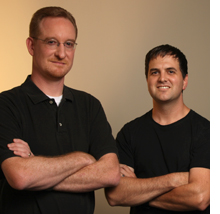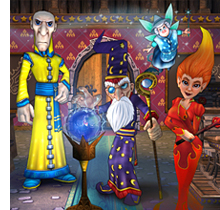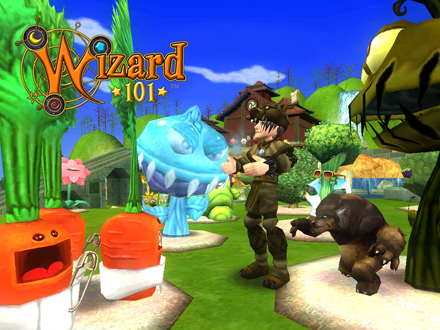Thursday, September 8th, 2011
[The following is an article I wrote for the September 2011 issue of Children’s Technology Review. If you’re interested in the new 360KID Q2 2011 virtual world report, you can purchase the full report, which includes an expanded Wizard101 interview, by emailing me at scott (at) 360KID (dot) com with “Virtual World Research Report” in the Subject line. The next quarterly report will be completed in late October, 2011.]

Being the number one virtual world for kids is no small thing, especially in these days of Disney, Nick and Cartoon Network. But what’s interesting about Wizard101 is that 60% of visitors are playing with another member of their family (at least, according to a recent Trinity University study). What’s are they doing right?
To find out, CTR correspondent Scott Traylor interviewed head wizards at KingsIsle: Josef Hall and Todd Coleman, on a quest for their magic formula. Note that portions of this interview have been condensed, and this interview is part of a larger report that is sold separately.
Where did the Wizard101 idea come from?

Josef Hall: We started talking about it seven years ago. I have three kids, they were young then, and I wanted them to have a safe and high-quality online game. Todd and I thought the children’s space really seemed underserved. We wanted to make something that was triple-A, super high-quality. Something we could feel comfortable with our kids and other kids playing.
Todd Coleman: Josef and I were founders of another game company that made hardcore fantasy games with violence and mature themes. We were interested in going in a different direction, a more lighthearted approach to gaming through storytelling.
So the founders of KingsIsle brought you on and charged you with developing a virtual world product for them?
Todd: The story goes back earlier than that. Elie Akilian, our CEO and primary investor had an idea to create a new kind of game company. He talked to a dozen or more game companies to find a partner. At the same time he was searching for a partner, Josef and I were out talking to big publishing houses about a new kind of game we wanted to create. What’s funny about both sides of that story, neither of us were finding traction. Elie found that game companies were mostly interested in making shooters or army games or post-apocalyptic games, hardcore games for hardcode players. When Josef and I were talking to studios, those were the same types of games they wanted to fund. We stumbled into Elie who looked at us, having come out of the hardcore game space, now pitching a wizard game for the family, and it became apparent we should join forces.
From the beginning the idea was to create a family-based wizarding world, even before KingsIsle was formed?
Todd: Yes, in fact if you go back and read the high concept document that Josef and I put together, it’s amazing how much of that original vision is exactly the same as what we created.
How long were you in development?
Josef: About two and a half years before we went into alpha with friends and family.
Todd: And another eight weeks before we went live.
Did the masses come right away?
Todd: It took time. It was about six months of steady growth, but we hadn’t yet hit the tipping point. That was in December 2008 when it started to pick up steam.
Josef: We did some national television advertising, then things really took off. We started growing quickly around that time, and we knew we had something special.
How has Wizard101 changed since you launched?
Josef: The game has stayed true to what it was when we launched, but we’ve added a lot of things, like a housing system and gardening. Everything has kind of the wizard slant. The gardening’s not a normal gardening system. You grow funny plants that have a lot of character and personality, like Couch Potatoes which are little spuds sitting on couches watching TV and talking to each other. It’s all very tongue-in-cheek. We’ve added a pet system where you can own pets and grow them through different in-game mini games. We’ve also added a lot of new worlds, some are pretty big departures from the existing world, like Celestia, which is underwater.

[CTR Editor’s note: Most of these are premium features, available only with a code that costs up to $39. That’s the magic of Wizard101’s business model.]
Have you learned anything surprising about your audience?
Todd: It’s a wider age spectrum than we expected. We started hearing grandparents were getting into the game, using it as a way to stay connected to their grandchildren. This was really surprising and just really cool to us. It’s something you can’t predict going in. You sit down, make the best game you can, and what you don’t really have control over is player behaviors. Players come into this empty world you crafted. They bring their own hopes and expectations and experiences and relationships. Then the world starts to take on a life of its own. It’s an amazing thing to watch.
How has the business of virtual worlds changed in the last few years?
Todd: Back when we started Wizard, the biggest game at the time was EverQuest, having amassed 400 thousand people. The prevailing thought in the industry at the time was any new virtual worlds to come out would simply carve up the same base of 400 thousand players. Then World of Warcraft launched and started racking up millions upon millions of players. All of a sudden people realized there was a new market. After that, the free-to-play model started in Asia. When it first came to the US, people thought that model would never fly, and of course that was not the case. Today you’re seeing these very casual games pop up on Facebook, and people who never considered themselves gamers, hundreds of millions of people, are now playing on a daily basis. Using those games as a way to connect with their friends.
What was your single biggest moment in the Wizard101 history?
Josef: One that jumps to mind was early on in development I came home and all the computers were taken over by my wife and kids. They were so deep into the game nobody noticed I came in the door. They were laughing and talking to each other, running around in the game. I knew at that moment we had built something that was a lot of fun for my family and would be fun for other families too. It was a wonderful moment.
Todd: My biggest moment was during development. I remember we had our first milestone, an internal test. We had created the art pieces and had engineering working on the code and a design group working on the players and the characters and pulling it all together. We fired it up, and Josef and I were able to jump in for the first time and play. It was that vision we had, taken from a “Wouldn’t it be cool?” conversation to actually seeing it on the screen. It was buggy, the sound wasn’t working, the cinematics were too long, the cameras weren’t working, but looking past all those warts and seeing it, at that moment I knew it was going to work. Josef and I were like, “Okay, we’ve got something here.” I think it was two in the morning. But that moment, you turn that corner and know you’ve gone from an idea to an actual game. Nothing beats that.
(Photo and images © KingsIsle Entertainment)

